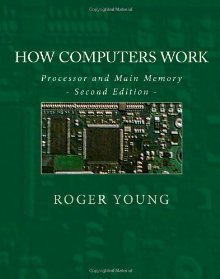
|
FreeComputerBooks.com
Links to Free Computer, Mathematics, Technical Books all over the World
|
|
- Title: How Computers Work: Processor and Main Memory
- Author(s) Roger Young
- Publisher: CreateSpace, 2nd edition (April 17, 2009); eBook (Last updated: January 2, 2018)
- Permission: Link to Book's Homepage.
- Paperback: 152 pages
- eBook: HTML, PDF, and Microsoft Word
- Language: English
- ISBN-10: 1442113987
- ISBN-13: 978-1442113985
- Share This:

|
Computers are the most complex machines that have ever been created. This book will tell you how they work, and no technical knowledge is required. It explains in great detail the operation of a simple but functional computer.
Although transistors are mentioned, relays are used in the example circuitry for simplicity. Did you ever wonder what a bit, a pixel, a latch, a word (of memory), a data bus, an address bus, a memory, a register, a processor, a timing diagram, a clock (of a processor), an instruction, or machine code is?
Unlike most explanations of how computers work which are a lot of analogies or require a background in electrical engineering, this book will tell you precisely what each of them is and how each of them works without requiring any previous knowledge of computers, programming, or electronics.
This book starts out very simple and gets more complex as it goes along, but everything is explained. The processor and memory are mainly covered.
About the Authors- Roger Stephen Young lives in Pennsylvania and graduated from The Pennsylvania State University where he majored in physics and was interested in transistors. He went to The California State University at Fullerton and worked on a Master's degree in electrical engineering for two years, but got a job at Texas Instruments before finishing. He has extensive programming experience.
- Computer Hardware, Personal Computers, and the History of Computers
- Computer System, Organization, and Architecture
- Computer Science
 Similar Books:
Similar Books:
-
 What Every Programmer Should Know About Memory
What Every Programmer Should Know About Memory
This document explains the structure of memory subsystems in use on modern commodity hardware, illustrating why CPU caches were developed, how they work, and what programs should do to achieve optimal performance by utilizing them.
-
 Understanding Computers, Smartphones and the Internet
Understanding Computers, Smartphones and the Internet
This book is for people who would like to understand how computers work, without having to learn a lot of technical details. Only the most important things about computers are covered. There is no math except some simple arithmetic.
-
 The Secret Guide to Computers (Russ Walter)
The Secret Guide to Computers (Russ Walter)
It's the one book that covers everything today's beginners and near-beginners need to know: not just about Windows, but also about software, hardware, and the Internet. It explains complicated concepts simply and clearly, and empowering beginners.
-
 PC Architecture (Michael Karbo)
PC Architecture (Michael Karbo)
This guide is written in easy language and contains a lot of illustrations. The author would like to give you enough insight into and confidence about your PC's workings that you would dare to upgrade your PC, or build your next PC yourself.
-
 Basic Computer Architecture (Smruti R. Sarangi)
Basic Computer Architecture (Smruti R. Sarangi)
This book is a comprehensive text on basic, undergraduate-level computer architecture. It includes the combinational units, ALUs, processor, basic 5-stage pipeline, and a microcode-based design.
-
 Computer Organization and Design Fundamentals
Computer Organization and Design Fundamentals
This book takes the reader from the basic design principles of the modern digital computer to a top-level examination of its architecture. The material is presented using practical terms and examples for a better computer systems design.
-
 Principles of Computer System Design: An Introduction (J. Saltzer)
Principles of Computer System Design: An Introduction (J. Saltzer)
This book takes a principles-based approach to the computer system design. Through carefully analyzed case studies from each of these disciplines, it demonstrates how to apply these concepts to tackle practical system design problems.
-
 Computer Systems: A Programmer's Perspective, 2nd Edition
Computer Systems: A Programmer's Perspective, 2nd Edition
This book introduces the important and enduring concepts that underlie computer systems by showing how these ideas affect the correctness, performance, and utility of application programs.
-
 The Elements of Computing Systems: Building a Modern Computer
The Elements of Computing Systems: Building a Modern Computer
This book gives a refreshingly new way of looking at computer systems as a whole by considering all aspects of a complete system in an integrated manner, as its comes to play in the construction of a simple yet powerful computer system.





